- Home
- E. M. Forster
The Longest Journey Page 17
The Longest Journey Read online
Page 17
“Yes. Tradition is of incalculable value. And I envy those schools that have a natural connection with the past. Of course Sawston has a past, though not of the kind that you quite want. The sons of poor tradesmen went to it at first. So wouldn’t its traditions be more likely to linger in the Commercial School?” he concluded nervously.
“You have a great deal to learn—a very great deal. Listen to me. Why has Sawston no traditions?” His round, rather foolish, face assumed the expression of a conspirator. Bending over the mutton, he whispered, “I can tell you why. Owing to the day-boys. How can traditions flourish in such soil? Picture the day-boy’s life—at home for meals, at home for preparation, at home for sleep, running home with every fancied wrong. There are dayboys in your class, and, mark my words, they will give you ten times as much trouble as the boarders,—late, slovenly, stopping away at the slightest pretext. And then the letters from the parents! ‘Why has my boy not been moved this term?’ ‘Why has my boy been moved this term?’ ‘I am a dissenter, and do not wish my boy to subscribe to the school mission.’ ‘Can you let my boy off early to water the garden?’ Remember that I have been a dayboy house-master, and tried to infuse some esprit de corps into them. It is practically impossible. They come as units, and units they remain. Worse. They infect the boarders. Their pestilential, critical, discontented attitude is spreading over the school. If I had my own way—”
He stopped somewhat abruptly.
“Was that why you laughed at their singing?”
“Not at all. Not at all. It is not my habit to set one section of the school against the other.”
After a little they went the rounds. The boys were in bed now. “Good-night!” called Herbert, standing in the corridor of the cubicles, and from behind each of the green curtains came the sound of a voice replying, “Good-night, sir!” “Good-night,” he observed into each dormitory. Then he went to the switch in the passage and plunged the whole house into darkness. Rickie lingered behind him, strangely impressed. In the morning those boys had been scattered over England, leading their own lives. Now, for three months, they must change everything—see new faces, accept new ideals. They, like himself, must enter a beneficent machine, and learn the value of esprit de corps. Good luck attend them—good luck and a happy release. For his heart would have them not in these cubicles and dormitories, but each in his own dear home, amongst faces and things that he knew.
Next morning, after chapel, he made the acquaintance of his class. Towards that he felt very differently. Esprit de corps was not expected of it. It was simply two dozen boys who were gathered together for the purpose of learning Latin. His duties and difficulties would not lie here. He was not required to provide it with an atmosphere. The scheme of work was already mapped out, and he started gaily upon familiar words—
“Pan, ovium custos, tua si tibi Mænala curæ
Adsis, O Tegæe, favens.”
“Do you think that beautiful?” he asked, and received the honest answer, “No, sir; I don’t think I do.” He met Herbert in high spirits in the quadrangle during the interval. But Herbert thought his enthusiasm rather amateurish, and cautioned him.
“You must take care they don’t get out of hand. I approve of a lively teacher, but discipline must be established first.”
“I felt myself a learner, not a teacher. If I’m wrong over a point, or don’t know, I mean to tell them at once.”
Herbert shook his head.
“It’s different if I was really a scholar. But I can’t pose as one, can I? I know much more than the boys, but I know very little. Surely the honest thing is to be myself to them. Let them accept or refuse me as that. That’s the only attitude we shall any of us profit by in the end.”
Mr. Pembroke was silent. Then he observed, “There is, as you say, a higher attitude and a lower attitude. Yet here, as so often, cannot we find a golden mean between them?”
“What’s that?” said a dreamy voice. They turned and saw a tall, spectacled man, who greeted the newcomer kindly, and took hold of his arm. “What’s that about the golden mean?”
“Mr. Jackson—Mr. Elliot: Mr. Elliot—Mr. Jackson,” said Herbert, who did not seem quite pleased. “Rickie, have you a moment to spare me?”
But the humanist spoke to the young man about the golden mean and the pinchbeck mean, adding, “You know the Greeks aren’t broad church clergymen. They really aren’t, in spite of much conflicting evidence. Boys will regard Sophocles as a kind of enlightened bishop, and something tells me that they are wrong.”
“Mr. Jackson is a classical enthusiast,” said Herbert. “He makes the past live. I want to talk to you about the humdrum present.”
“And I am warning him against the humdrum past. That’s another point, Mr. Elliot. Impress on your class that many Greeks and most Romans were frightfully stupid, and if they disbelieve you, read Ctesiphon with them, or Valerius Flaccus. Whatever is that noise?”
“It comes from your class-room, I think,” snapped the other master.
“So it does. Ah, yes. I expect they are putting your little Tewson into the waste-paper basket.”
“I always lock my class-room in the interval—”
“Yes?”
“—and carry the key in my pocket.”
“Ah. But, Mr. Elliot, I am a cousin of Widdrington’s. He wrote to me about you. I am so glad. Will you, first of all, come to supper next Sunday?”
“I am afraid,” put in Herbert, “that we poor house-masters must deny ourselves festivities in term time.”
“But mayn’t he come once, just once?”
“May, my dear Jackson! My brother-in-law is not a baby. He decides for himself.”
Rickie naturally refused. As soon as they were out of hearing, Herbert said, “This is a little unfortunate. Who is Mr. Widdrington?”
“I knew him at Cambridge.”
“Let me explain how we stand,” he continued, after a pause. “Jackson is the worst of the reactionaries here, while I—why should I conceal it?—have thrown in my lot with the party of progress. You will see how we suffer from him at the masters’ meetings. He has no talent for organization, and yet he is always inflicting his ideas on others. It was like his impertinence to dictate to you what authors you should read, and meanwhile the sixth-form room like a bear-garden, and a school prefect being put into the waste-paper basket. My good Rickie, there’s nothing to smile at. How is the school to go on with a man like that? It would be a case of ‘quick march,’ if it was not for his brilliant intellect. That’s why I say it’s a little unfortunate. You will have very little in common, you and he.”
Rickie did not answer. He was very fond of Widdrington, who was a quaint, sensitive person. And he could not help being attracted by Mr. Jackson, whose welcome contrasted pleasantly with the official breeziness of his other colleagues. He wondered, too, whether it is so very reactionary to contemplate the antique.
“It is true that I vote Conservative,” pursued Mr. Pembroke, apparently confronting some objector. “But why? Because the Conservatives, rather than the Liberals, stand for progress. One must not be misled by catch-words.”
“Didn’t you want to ask me something?”
“Ah, yes. You found a boy in your form called Varden?”
“Varden? Yes; there is.”
“Drop on him heavily. He has broken the statutes of the school. He is attending as a day-boy. The statutes provide that a boy must reside with his parents or guardians. He does neither. It must be stopped. You must tell the headmaster.”
“Where does the boy live?”
“At a certain Mrs. Orr’s, who has no connection with the school of any kind. It must be stopped. He must either enter a boarding-house or go.”
“But why should I tell?” said Rickie. He remembered the boy, an unattractive person with protruding ears. “It is the business of his house-master.”
“House-master—exactly. Here we come back again. Who is now the day-boys’ house-master? Jackson once again�
�as if anything was Jackson’s business! I handed the house back last term in a most flourishing condition. It has already gone to rack and ruin for the second time. To return to Varden. I have unearthed a put-up job. Mrs. Jackson and Mrs. Orr are friends. Do you see? It all works round.”
“I see. It does—or might.”
“The headmaster will never sanction it when it’s put to him plainly.”
“But why should I put it?” said Rickie, twisting the ribbons of his gown round his fingers.
“Because you’re the boy’s form-master.”
“Is that a reason?”
“Of course it is.”
“I only wondered whether—” He did not like to say that he wondered whether he need do it his first morning.
“By some means or other you must find out—of course you know already, but you must find out from the boy. I know—I have it! Where’s his health certificate?”
“He had forgotten it.”
“Just like them. Well, when he brings it, it will be signed by Mrs. Orr, and you must look at it and say, ‘Orr—Orr—Mrs. Orr?’ or something to that effect, and then the whole thing will come naturally out.”
The bell rang, and they went in for the hour of school that concluded the morning. Varden brought his health certificate—a pompous document asserting that he had not suffered from roseola or kindred ailments in the holidays—and for a long time Rickie sat with it before him, spread open upon his desk. He did not quite like the job. It suggested intrigue, and he had come to Sawston not to intrigue but to labour. Doubtless Herbert was right, and Mr. Jackson and Mrs. Orr were wrong. But why could they not have it out among themselves? Then he thought, “I am a coward, and that’s why I’m raising these objections,” called the boy up to him, and it did all come out naturally, more or less. Hitherto Varden had lived with his mother; but she had left Sawston at Christmas, and now he would live with Mrs. Orr. “Mr. Jackson, sir, said it would be all right.”
“Yes, yes,” said Rickie; “quite so.” He remembered Herbert’s dictum: “Masters must present a united front. If they do not—the deluge.” He sent the boy back to his seat, and after school took the compromising health certificate to the headmaster. The headmaster was at that time easily excited by a breach of the constitution. “Parents or guardians,” he repeated—“parents or guardians,” and flew with those words on his lips to Mr. Jackson.
To say that Rickie was a cat’s-paw is to put it too strongly. Herbert was strictly honourable, and never pushed him into an illegal or really dangerous position; but there is no doubt that on this and on many other occasions he had to do things that he would not otherwise have done. There was always some diplomatic corner that had to be turned, always something that he had to say or not to say. As the term wore on he lost his independence—almost without knowing it. He had much to learn about boys, and he learnt not by direct observation—for which he believed he was unfitted—but by sedulous imitation of the more experienced masters. Originally he had intended to be friends with his pupils, and Mr. Pembroke commended the intention highly; but you cannot be friends either with boy or man unless you give yourself away in the process, and Mr. Pembroke did not commend this. He, for “personal intercourse,” substituted the safer “personal influence,” and gave his junior hints on the setting of kindly traps, in which the boy does give himself away and reveals his shy delicate thoughts, while the master, intact, commends or corrects them. Originally Rickie had meant to help boys in the anxieties that they undergo when changing into men: at Cambridge he had numbered this among life’s duties. But here is a subject in which we must inevitably speak as one human being to another, not as one who has authority or the shadow of authority, and for this reason the elder school-master could suggest nothing but a few formulæ. Formulæ, like kindly traps, were not in Rickie’s line, so he abandoned these subjects altogether and confined himself to working hard at what was easy. In the house he did as Herbert did, and referred all doubtful subjects to him. In his form, oddly enough, he became a martinet. It is so much simpler to be severe. He grasped the school regulations, and insisted on prompt obedience to them. He adopted the doctrine of collective responsibility. When one boy was late, he punished the whole form. “I can’t help it,” he would say, as if he was a power of nature. As a teacher he was rather dull. He curbed his own enthusiasms, finding that they distracted his attention, and that while he throbbed to the music of Virgil the boys in the back row were getting unruly. But on the whole he liked his form work: he knew why he was there, and Herbert did not overshadow him so completely.
What was amiss with Herbert? He had known that something was amiss, and had entered into partnership with open eyes. The man was kind and unselfish; more than that, he was truly charitable, and it was a real pleasure to him to give pleasure to others. Certainly he might talk too much about it afterwards; but it was the doing, not the talking, that he really valued, and benefactors of this sort are not too common. He was, moreover, diligent and conscientious: his heart was in his work, and his adherence to the Church of England no mere matter of form. He was capable of affection: he was usually courteous and tolerant. Then what was amiss? Why, in spite of all these qualities, should Rickie feel that there was something wrong with him—nay, that he was wrong as a whole, and that if the Spirit of Humanity should ever hold a judgment he would assuredly be classed among the goats? The answer at first sight appeared a graceless one—it was that Herbert was stupid. Not stupid in the ordinary sense—he had a business-like brain, and acquired knowledge easily—but stupid in the important sense: his whole life was coloured by a contempt of the intellect. That he had a tolerable intellect of his own was not the point: it is in what we value, not in what we have, that the test of us resides. Now, Rickie’s intellect was not remarkable. He came to his worthier results rather by imagination and instinct than by logic. An argument confused him, and he could with difficulty follow it even on paper. But he saw in this no reason for satisfaction, and tried to make such use of his brain as he could, just as a weak athlete might lovingly exercise his body. Like a weak athlete, too, he loved to watch the exploits, or rather the efforts, of others—their efforts not so much to acquire knowledge as to dispel a little of the darkness by which we and all our acquisitions are surrounded. Cambridge had taught him this, and he knew, if for no other reason, that his time there had not been in vain. And Herbert’s contempt for such efforts revolted him. He saw that for all his fine talk about a spiritual life he had but one test for things—success: success for the body in this life or for the soul in the life to come. And for this reason Humanity, and perhaps such other tribunals as there may be, would assuredly reject him.
18
Meanwhile he was a husband. Perhaps his union should have been emphasized before. The crown of life had been attained, the vague yearnings, the misread impulses, had found accomplishment at last. Never again must he feel lonely, or as one who stands out of the broad highway of the world and fears, like poor Shelley, to undertake the longest journey. So he reasoned, and at first took the accomplishment for granted. But as the term passed he knew that behind the yearning there remained a yearning, behind the drawn veil a veil that he could not draw. His wedding had been no mighty landmark: he would often wonder whether such and such a speech or incident came after it or before. Since that meeting in the Soho restaurant there had been so much to do—clothes to buy, presents to thank for, a brief visit to a Training College, a honeymoon as brief. In such a bustle, what spiritual union could take place? Surely the dust would settle soon: in Italy, at Easter, he might perceive the infinities of love. But love had shown him its infinities already. Neither by marriage nor by any other device can men insure themselves a vision; and Rickie’s had been granted him three years before, when he had seen his wife and a dead man clasped in each other’s arms. She was never to be so real to him again.
She ran about the house looking handsomer than ever. Her cheerful voice gave orders to the servants. As he sat in the
study correcting compositions, she would dart in and give him a kiss. “Dear girl—–” he would murmur, with a glance at the rings on her hand. The tone of their marriage life was soon set. It was to be a frank good-fellowship, and before long he found it difficult to speak in a deeper key.
One evening he made the effort. There had been more beauty than was usual at Sawston. The air was pure and quiet. Tomorrow the fog might be here, but today one said, “It is like the country.” Arm in arm they strolled in the side-garden, stopping at times to notice the crocuses, or to wonder when the daffodils would flower. Suddenly he tightened his pressure, and said, “Darling, why don’t you still wear ear-rings?”
“Ear-rings?” She laughed. “My taste has improved, perhaps.”
So after all they never mentioned Gerald’s name. But he hoped it was still dear to her. He did not want her to forget the greatest moment in her life. His love desired not ownership but confidence, and to a love so pure it does not seem terrible to come second.
He valued emotion—not for itself, but because it is the only final path to intimacy. She, ever robust and practical, always discouraged him. She was not cold; she would willingly embrace him. But she hated being upset, and would laugh or thrust him off when his voice grew serious. In this she reminded him of his mother. But his mother—he had never concealed it from himself—had glories to which his wife would never attain: glories that had unfolded against a life of horror—a life even more horrible than he had guessed. He thought of her often during these earlier months. Did she bless his union, so different to her own? Did she love his wife? He tried to speak of her to Agnes, but again she was reluctant. And perhaps it was this aversion to acknowledge the dead, whose images alone have immortality, that made her own image somewhat transient, so that when he left her no mystic influence remained, and only by an effort could he realize that God had united them for ever.

 The Celestial Omnibus and Other Stories
The Celestial Omnibus and Other Stories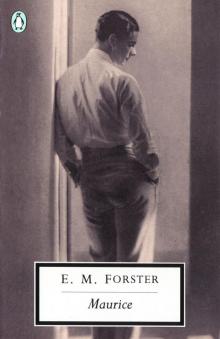 Maurice
Maurice The Longest Journey
The Longest Journey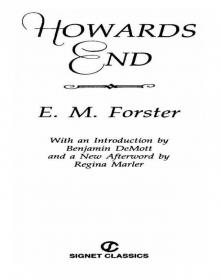 Howards End
Howards End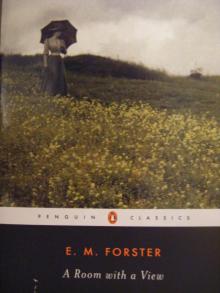 A Room with a View
A Room with a View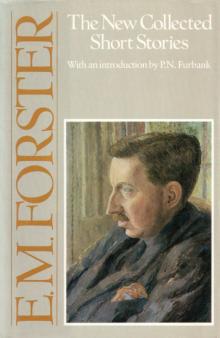 The New Collected Short Stories
The New Collected Short Stories A Passage to India
A Passage to India Where Angels Fear to Tread
Where Angels Fear to Tread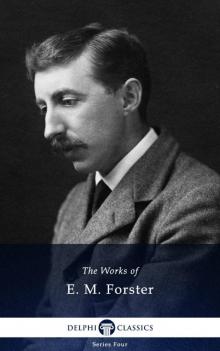 Works of E M Forster
Works of E M Forster Selected Stories
Selected Stories The Machine Stops
The Machine Stops Aspects of the Novel
Aspects of the Novel